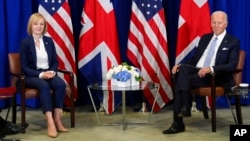President Joe Biden sat down with his British counterpart for the first time Wednesday on the sidelines of the U.N. General Assembly, calling Britain “our closest ally in the world” and resolving to work together on issues from dealing with the conflict in Ukraine to maintaining peace in Northern Ireland as Britain exits the European Union.
Biden and Prime Minister Liz Truss chose to meet in New York, rather than in London, where Biden was just days earlier for the funeral of Queen Elizabeth II. Both began their brief public comments by mentioning the queen, who reigned for 70 years.
“She was the rock on which modern Britain was built,” Truss said, after thanking Biden and first lady Jill Biden for attending the queen’s funeral on Monday.
“There's no issues I can think of global consequence where the United States and United Kingdom are not working in cooperation,” Biden said ahead of the meeting between top U.S. and British officials. “And I expect that we’ll be able to continue to be able to do that. And we have a full agenda today from supporting Ukraine as it defends itself against Russia, and Putin’s challenges, as well as China, and as posed by preventing Iran from acquiring nuclear weapons as well. There’s a lot on the agenda.”
Truss also said her nation would boost defense spending to meet the challenges posed by Russia’s invasion of Ukraine.
“We face huge challenges as autocracies seek to cement and increase their assertiveness around the world,” she said. “And that is why we're stepping up in terms of our defense spending, we're going to be moving to 3% of GDP on defense spending. And that's why we want to work more closely with the United States, especially on energy security, on our economic security, but also in reaching out to fellow democracies around the world to make sure that democracies prevail, and we protect the freedom and future of our citizens.”
One analyst said the link between defense spending and democracy promotion is thin.
“Prime Minister Truss is doubling down on the democracy vs. autocracies agenda but with little detail on how raising the UK's defense budget will help democracies prevail,” said Leslie Vinjamuri, director of the U.S. and Americas Program at British think tank Chatham House.
“The U.S. is under pressure to demonstrate that democracy can deliver … and it feels like the prime minister is a little behind the curve. The U.S. would probably see a lot of value in a UK that returns to its role as a champion of international development, especially at a time when the challenge of food security and longer development issues are top of the global agenda,” Vinjamuri said.
Both leaders also agreed to discuss how to uphold the 1998 Good Friday agreement that ended conflict in Northern Ireland.
Biden did not answer shouted questions about mounting protests in Russia over President Vladimir Putin’s Wednesday announcement that he would mobilize 300,000 more troops for the conflict in Ukraine. And when asked if the U.S.-UK relationship was still “special,” Truss simply nodded.




